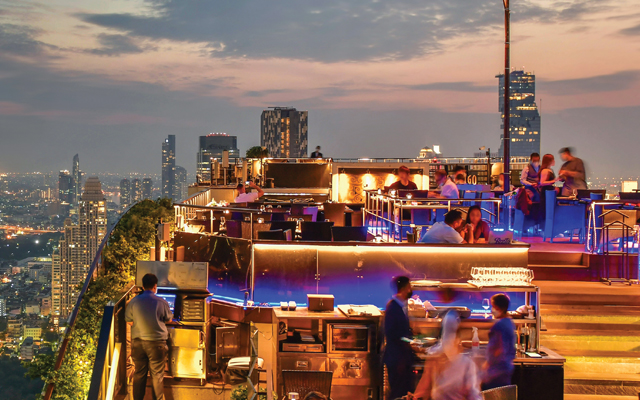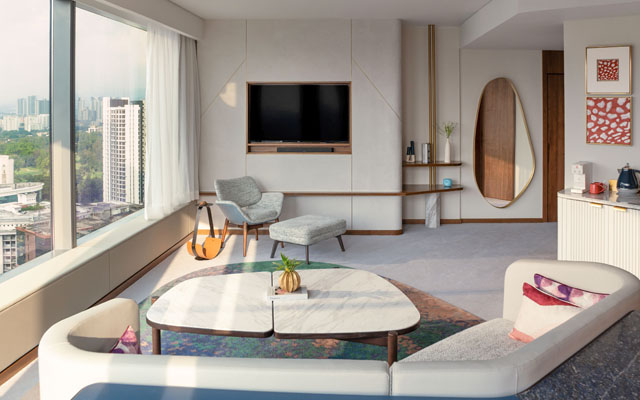Bangkok’s luxury developments are fast emerging and blending with under-the-radar options elsewhere in the country, creating a destination of varied experiences for discerning travellers
The Thai capital is experiencing a luxury renaissance, recently receiving its first Ritz-Carlton hotel and its first three-star Michelin restaurant, Sorn – the world’s first restaurant serving Thai cuisine to attain the accolade. Other high-profile openings such as Nobu Bangkok, the Okura Cruise, and new ventures by Gordon Ramsay have solidified Bangkok’s reputation as a fine-dining capital. Indeed, Michelin’s 2025 Guide recognises nearly 500 restaurants in 13 provinces across the country.
The hospitality sector is keeping pace, with long-anticipated luxury developments like Dusit Central Park – the brand’s redeveloped flagship showcasing the height of Thai-inspired luxury architecture – and Aman Nai Lert Park hitting the capital, while Andaz, Nobu, Plaza Athénée, Six Senses and The Langham are all set to make their mark in Bangkok by 2026.

Designer brands are also embracing the trend, with LV The Place Bangkok and Dior’s Gold House being unveiled last year.
Meanwhile, the hit series The White Lotus, whose third season debuted in February on HBO Max, has captured the allure of jet-setting glamour under the Thai sun, enticing its fanbase to visit filming locations at ultra-luxury resorts like Four Seasons Koh Samui, and three Anantara properties by Minor International in Phuket and Samui.
In a nod to the series, the Four Seasons Hotel Bangkok at Chao Phraya River has even introduced a White Lotus-themed afternoon tea.
Antonio Saponara, general manager of Capella Bangkok, whose F&B outlet Côte by Mauro Colagreco earned an additional Michelin star – making it the one venue to rise to two stars in the latest guide – emphasises the importance of quality and personalisation. These elements, which are integrated in the hotel’s Capella Curates programme, play a key role in shaping Thailand’s luxury appeal.
“The exceptional quality of offerings across Thailand’s luxury sector – hospitality, retail, and experiences – has led to a surge in interest from affluent travellers, bolstered by the strategic efforts of the Tourism Authority of Thailand in attracting luxury travellers,” Saponara noted.
He pointed to the “very high rate of returning clientele” as a testament to Thailand’s enduring draw.
Capella Bangkok itself has acquired a loyal following in shorthaul markets with a rising affluent demographic, such as Singapore, South Korea and Hong Kong, while Saponara said longhaul markets, particularly in Europe and the Americas, are increasingly drawn to Thailand’s luxury sector.
Daniel Fraser, co-founder and CEO of Smiling Albino, said the influx of world-class dining and hospitality brands is a catalyst for positioning Thailand as a top choice for high-end travelers.
“While luxury itself may not be the sole driver, we’ve seen a significant uptick in requests for high-profile restaurants and hotels in Bangkok and Phuket. This past festive season, we arranged numerous reservations at places like Sorn, Nobu, and other exciting new venues,” Fraser told TTG Asia.
Beyond five-star accommodation and Michelin-starred dining, Fraser observed a growing appetite for deeply personalised experiences.
“Travellers today want more than just a premium hotel stay – they’re seeking exclusive access to cultural touchpoints that can’t simply be booked online,” he said.
Andre van der Marck, founder and managing director of Travel Exclusive Asia, echoed this sentiment, emphasising that high-end tourists increasingly favour depth over breadth.
“Luxury travellers prefer fewer destinations with in-depth, private experiences rather than packed itineraries. Exclusive options, such as private jet-skiing on the Mekong or after-hours visits to the Grand Palace, are in high demand,” he explained, adding that sustainability has also become a core expectation, with eco-conscious travel emerging as a crucial factor in decision-making.
It is no surprise that the rise in luxury travel demand has attracted new players to the market. Earlier this year, Elevate DMC opened its first office in Bangkok, a testament to the city’s evolution as a premier luxury destination.
“When I first moved to Thailand in 2006, Bangkok still felt very much like a Thai city. Today, it’s an international standard destination, on par with places like Hong Kong and Singapore. The overall service levels across Thailand have risen to meet global luxury benchmarks,” reflects Georgie Walsh, general manager of Elevate DMC.
With better infrastructure for premium experiences, Walsh sees more creative freedom for DMCs.
She stated: “We can now offer a broader range of independent experiences outside of luxury hotels for high-end travellers.”
Walsh also noted that the quality and availability of services in Thailand made it “easier to craft bespoke journeys,” extending trips beyond Bangkok and into lesser-known but equally refined destinations.
While luxury properties, fine dining venues, and designer brands flourish, there remains a stark disconnect between private investment and public infrastructure development.
“Thailand is full of luxury developments – malls, hotels, villas – but the public sector hasn’t kept pace,” van der Marck pointed out.
“Traffic congestion, waste management issues, and overcrowding detract from the exclusivity of Thailand’s luxury offerings. Ultra-high-net-worth travellers often reconsider destinations like Phuket due to infrastructure concerns,” he added.
Moreover, the influx of mass-market tourism, particularly from China, Russia, and India, presents another challenge. While these travellers contribute significantly to overall arrivals, they often gravitate toward mainstream attractions, creating a perception of over-tourism that high-end clientele seek to avoid.
“Some affluent travellers are opting for more secluded, under-the-radar destinations rather than traditional luxury hubs like Phuket,” van der Marck said.
That said, some industry players see this as an opportunity to redefine luxury beyond opulence.
Fraser believes that Thailand’s true competitive edge lies in offering “high-value experiences for discerning travellers” rather than being driven purely by “luxury.”
“The real opportunity is in positioning Thailand as a place where travellers can access world-class experiences – whether in fine dining, wellness, or high-end accommodation – at a fraction of the cost they’d pay in Europe, Japan, or the US,” he opined, summarising that what will set Thailand apart is the ability to pair these premium offerings with authentic, meaningful and even life-changing cultural experiences.











